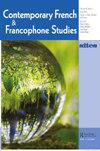不感兴趣的兴趣:奥利坡面对中国1
IF 0.2
4区 文学
0 LITERATURE, ROMANCE
引用次数: 0
摘要
摘要 本文旨在揭示和研究欧利浦与中国的关系。虽然米歇尔-梅泰尔(Michèle Métail)和雷蒙德-基诺(Raymond Queneau)等个别成员似乎在表面上促成了该团体对中国的亲近,但对两种 "欧利浦主义 "倾向的深入分析表明,这种兴趣从根本上说是非个人的、超脱的。欧利浦主义的本质意味着该团体永远不会被任何单一的影响所迷惑,即使对中国的灵感也持开放态度。因此,欧利浦对中国怀有一种无私的兴趣--被中国的潜力所吸引,但又不会为之着迷。本文章由计算机程序翻译,如有差异,请以英文原文为准。
A Disinterested Interest: Oulipo Facing China1
Abstract This article aims to reveal and examine Oulipo’s engagement with China. While individual members like Michèle Métail and Raymond Queneau have seemingly contributed to the group’s affinity for China on a superficial level, a deeper analysis of the two Oulipism tendencies suggests this interest is fundamentally impersonal and detached. The essence of Oulipism means the group can never be fascinated by any single influence, even while remaining open to Chinese inspiration. Thus, Oulipo harbors what can be characterized as a disinterested interest in China—intrigued by its potential without becoming enthralled by it.
求助全文
通过发布文献求助,成功后即可免费获取论文全文。
去求助
来源期刊

Contemporary French and Francophone Studies
LITERATURE, ROMANCE-
CiteScore
0.30
自引率
0.00%
发文量
43
期刊介绍:
An established journal of reference inviting all critical approaches on the latest debates and issues in the field, Contemporary French & Francophone Studies (formerly known as SITES) provides a forum not only for academics, but for novelists, poets, artists, journalists, and filmmakers as well. In addition to its focus on French and Francophone studies, one of the journal"s primary objectives is to reflect the interdisciplinary direction taken by the field and by the humanities and the arts in general. CF&FS is published five times per year, with four issues devoted to particular themes, and a fifth issue, “The Open Issue” welcoming non-thematic contributions.
 求助内容:
求助内容: 应助结果提醒方式:
应助结果提醒方式:


